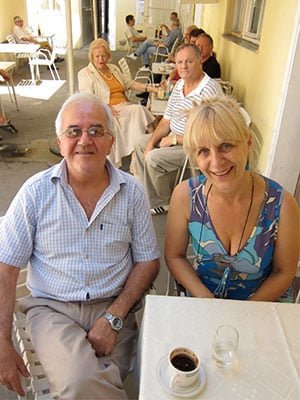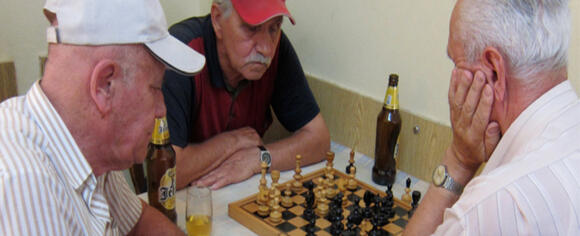With more than 17 per cent of its citizens being over the age of 65, Serbia's proportion of elderly people is among the highest in the world. In this Balkan nation, as in other countries in the region, family still plays the predominant role in providing social support and care for senior citizens. But increasingly, the government is finding new ways to provide support.
Over the last 30 years, according to the Institute for Gerontology in Belgrade, the number of long-term care facilities for elderly people has increased by nearly 20 per cent. There is, however, still much work to be done. Efforts in the public sector to further improve elderly care in Serbia include structural reforms of the social and health care systems, as well as establishing senior citizens’ centres to ease the burden of care from the traditional family. On the International Day of Older Persons, 1 October 2011, UNFPA and its partners seek to identify new opportunities to advocate for and support the rights of ageing populations around the world.
Providing health care and moral support for senior citizens
As lunchtime approaches at the Senior Citizens’ Centre on the outskirts of Belgrade, all the tables in the game room are full. The weekly medical session offering free blood pressure readings has already filled up, and the hair dresser offering discounted cuts is finishing the remaining customers. For the seniors, this is a time for their last hand of cards or a quick game of dominoes before lunch.

Meanwhile, the Centre’s organizing committee is looking over the photos taken during the last organized outing. The pictures laid out on the table show group shots of smiling senior citizens in their colourful national costumes. It is the committee’s job to plan activities to keep up the members’ morale, a result that is far less likely if they were to stay alone at home.
“That’s our personal mission and the reason for our existence,” says Spiro Bezbradica, President of the Municipal Organization of Pensioners, Zemun. “To find the right activities that will give them back their dignity and make them feel useful as if they have a place under the sun.” And when members are too frail to visit this Centre, it also falls to this committee to arrange home visits and organize volunteers to take care of seniors’ everyday needs.
A country in transition
Moving between the tables on this day is a familiar figure. With a ready smile and brimming with enthusiasm, Vladanka-Vanjya Miskin is a volunteer from the Union of Pensioners, Serbia. An umbrella organization representing nearly 200 senior citizens’ groups, the Union of Pensioners actively campaigns for the rights of Serbia’s seniors, with support from UNFPA.
“It’s not easy to be a pensioner anywhere in the world,” said Ms. Miskin, at the Union’s offices in Belgrade. “But it’s especially difficult in Serbia, because we are a country in transition, with socio-economic problems. And seniors are coping as best they can.” Moreover, the Union of Pensioners has identified within the elderly population a particularly vulnerable group.
“Elderly women are especially marginalized,” said Ms. Miskin. “The State has recently adopted a law, guaranteeing equality between men and women, so we are trying to reflect that in our work as well. We are trying to get as many women as possible active within our organization.”
Elsewhere in the city centre, opposite the main Government buildings, ruined office blocks still bear testimony to the war and the years of sanctions and isolation, which have left the country struggling economically.
National Strategy for Ageing
In 2005, an ambitious plan, the National Strategy for Ageing, was formulated to meet the needs of the country’s greying population, which should have been in place the following year. But the strategy, and its implementation has been delayed. “Frankly speaking, not much has been done so far,” says Marija Rakovic, National Programme Officer for the Fund. She explains that the National Strategy does not include an action plan or a budget. Without these two components, she says, it will be difficult to make operationalize it.
There are signs of progress at the national level, however. In 2011, the Ministry of Labour and Social Policy, re-established the National Council on Ageing; an expert advisory body to the Government, meant to ensure an action plan is implemented. For its part, UNFPA is working to ensure that the rights of the elderly are recognized and promoted at all levels of Government.
“One of the major things for UNFPA working here in Serbia is advocacy among decision makers,” said Marija Rakovic. “Unfortunately most of the ministries still don’t see their role, and they still do not see this problem of ageing as a burning issue in our country.”
UNFPA continues to support senior citizens in Serbia at the policy and advocacy levels by working with the Ministry of Labor, the National Council on Ageing and a range of relevant non-governmental organisations, including the Serbian Red Cross. A mechanism has been put into place to provide systematic technical and advisory support for the efforts of Serbian counterparts in policy-making.


